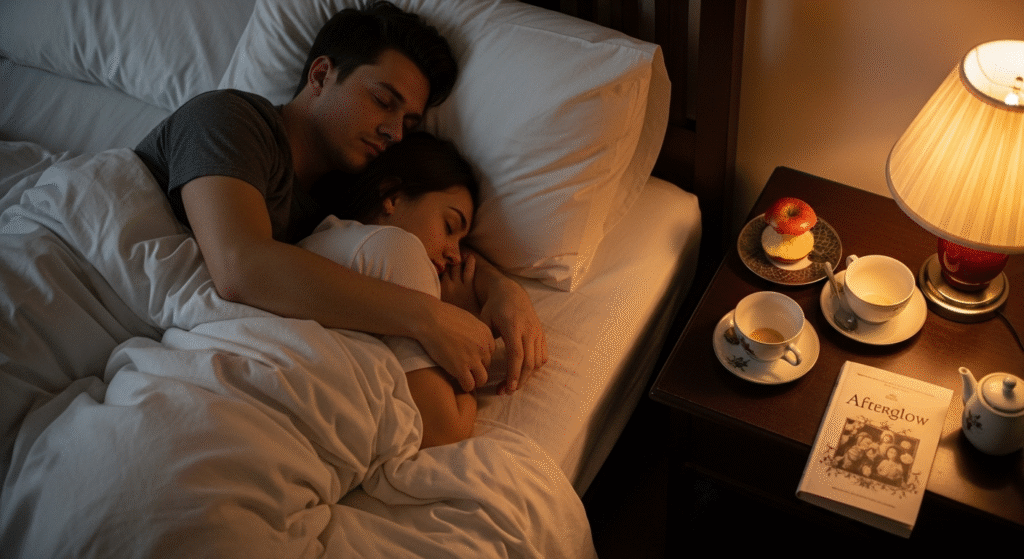Most people think sex ends when the lights go off or when the last gasp fades — spoiler: it doesn’t. The minutes (and sometimes hours) after sex are a tiny universe of chemistry, emotion, and small rituals that matter as much as the act itself. Whether you collapse into sleep, crave snacks, or suddenly feel unbearably affectionate (or weirdly sad), your body is doing something very specific. Ready to know why? Here are 7 surprising things that happen after sex — and what to do about each.
1) After sex your brain flips a “calm down” switch (hello hormones)
Right after orgasm your brain floods with chemicals: oxytocin (the cuddle hormone), dopamine (pleasure/reward), endorphins (natural painkillers) — and often prolactin, which can induce relaxation or sleepiness.
Why it matters: this cocktail explains the post-sex glow, the urge to snuggle, and why many people feel mellow or ready for bed. If you’re the type who wants to talk afterward, that surge of oxytocin is your ally. If your partner dozes off, prolactin might be the culprit — not a relationship crime.
Quick tip: Two minutes of eye contact and a soft “thank you” after sex lets oxytocin do its social work — bonding without awkwardness.
2) After sex your body cools down (and that’s why you get chills)

During sex your heart rate and body temp go up; afterward, your body works to regulate and cool itself. That sudden shiver or the urge to pull the blanket up? Normal thermoregulation.
Why it matters: temperature regulation can change comfort. A cozy shared blanket or a quick shower keeps the warmth pleasant without turning into an argument about whose feet are cold.
Quick tip: Keep a light blanket nearby. Cuddle + thermoregulation = double win.
3) After sex your immune system gets a little boost (yes, really)
Regular sexual activity has been linked in studies to subtle immune benefits — like higher levels of certain antibodies (e.g., IgA). Intimacy can be a small, free health perk.
Why it matters: while sex isn’t a substitute for vaccines or good hygiene, consistent intimate connections can be one of many tiny behaviors that support overall well-being.
Quick tip: Balance intimacy with basic hygiene: a quick rinse and handwash keeps things pleasant and healthy.
4) After sex you might be hungry, thirsty—or surprisingly not hungry at all
Sex burns calories and stimulates neurotransmitters that affect appetite. Some people want a snack immediately (hello, chocolate), others lose their appetite. Hydration also matters: sexual activity can dehydrate you slightly.
Why it matters: hunger or thirst after sex is normal. Choosing a light, healthy snack can refill energy without a sugar crash.
Quick tip: Keep easy post-sex snacks by the bed—bananas, yogurt, or dark chocolate are excellent choices.
5) After sex you might feel an emotional swing (hello post-coital dysphoria)
Not everyone experiences it, but some people feel tearful, anxious, or oddly empty after sex — a phenomenon called post-coital dysphoria (PCD). Hormonal shifts, emotional vulnerability, and personal history can combine to produce this.
Why it matters: PCD is common and not a sign of a broken relationship. It’s often temporary, but if it happens frequently it’s worth addressing with open communication or a professional.
Quick tip: If you feel sudden sadness, say something simple like “I’m feeling oddly down — can we sit together for a minute?” It validates the feeling without turning it into drama.
6) After sex, your body gives you natural pain relief (endorphins at work)
Orgasms release endorphins — your body’s natural painkillers. That’s why headaches, cramps, or muscle aches sometimes ease after sex. Pleasure as medicine? Not a bad deal.
Why it matters: sex can be a mood and pain management tool for some people. It’s one reason why people who are physically active or who experience chronic pain may benefit from consensual intimacy (with boundaries and consent, always).
Quick tip: If pain decreases after sex, note it. If pain increases, consult a healthcare provider.
7) After sex you often feel closer to your partner — if you let it happen
Oxytocin, the post-sex cuddle hormone, literally increases feelings of trust and bonding. The minutes after sex are prime time for intimacy-building behaviors: cuddling, whispering, small confessions, or gentle touch.
Why it matters: couples who use the after-sex window for genuine connection often report stronger emotional ties and higher relationship satisfaction.
Quick tip: Try a “two-minute debrief”: one thing you loved, one small request for next time. It’s short, positive, and builds intimacy.
Practical rituals that improve the after-sex experience
If you want to turn the after-time into a reliable intimacy booster rather than a random outcome, try a few small rituals:
- The 5-minute cuddle. No phones, no screens. Just presence.
- The snack ritual. Share a pre-agreed small treat (fruit or dark chocolate).
- The gratitude sentence. One short sentence: “That felt great—thank you.”
- The hydration habit. Two sips of water to rehydrate and center.
- The check-in. “How are you feeling?” — quick, open-ended, non-judgmental.
These practices only take seconds but dramatically reduce miscommunication and boost bonding.
Men vs. women: differences after sex (and why they don’t mean less love)
There are common patterns — e.g., many men feel sleepy post-orgasm, many women want conversation or cuddles — but these are statistical trends, not rules. Biology (hormones like prolactin and oxytocin) influences responses, but personal history, stress, mood, and relationship context matter too.
Quick tip: Instead of assuming, ask: “Do you want a cuddle or space?” Consent and curiosity beat assumptions every time.
Common myths about what happens after sex — busted
- Myth: “Men always fall asleep after sex.” → Biology can make this common, but it’s not absolute.
- Myth: “If someone wants space after sex, they don’t care.” → Often the opposite: they may need personal decompression.
- Myth: “Everything should feel perfect afterward.” → Not realistic. Emotional complexity is normal.
FAQ
Q: Why do I sometimes feel sad after sex?
A: This can be post-coital dysphoria — temporary feelings caused by hormonal and emotional shifts. If it’s frequent, consider talking to a therapist.
Q: Is it normal to fall asleep after sex?
A: Yes. The release of prolactin and general physical exertion can make sleep likely, especially for men.
Q: Does sex really boost the immune system?
A: Some studies show small immune benefits (e.g., increased IgA), but sex is only one piece of overall health.
Q: What should we do immediately after sex?
A: Hydrate, consider a quick restroom visit (helps prevent UTIs), and spend a few minutes connecting — a cuddle, a word, or a little silence together.

